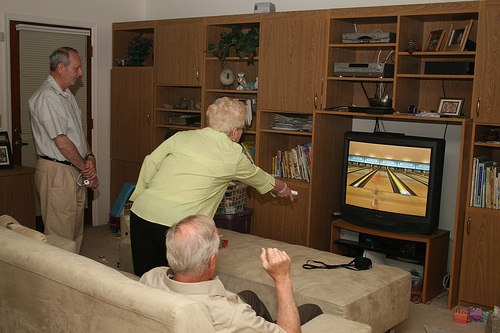Future Now
The IFTF Blog
Wii as a health tool
I was taking a quick break from an editing project and skimming the AP Wire news headlines when this one caught my eye: "Doctors use Wii games for rehab therapy." As IFTF Research Affiliate Richard Adler discussed during his presentation at our Spring 2007 Workshop on "Games and Gaming for Health" (his PowerPoint is available to Health Horizons members in our archives), Wiis have become a surprising source of physical activity for the senior citizen crowd.

But it turns out that "Wiihabilitation" is "fast becoming a craze in rehab therapy for patients recovering from strokes, broken bones, surgery and even combat injuries."
For those of you unfamiliar with the Wii, it is a video game system that uses a wireless motion-sensitive controller to simulate playing tennis, golf, baseball, bowling or boxing. Players direct the actions of animated athletes on the screen, using the same arm swings required by those sports in real life.
Playing with a Wii requires body movements similar to traditional therapy exercises but, according to James Osborn, who oversees rehabilitation services at Herrin Hospital in southern Illinois, its real benefit as a rehab tool is that patients become so engrossed mentally they're almost oblivious to the rigor. The article mentions several other medical facilities that have invested in Wiis, including the spinal cord injury unit at Hines Veterans Affairs Hospital west of Chicago and Walter Reed Army Medical Center.
Lt. Col. Stephanie Daugherty, chief of occupational therapy at Walter Reed, reports that Wii therapy "is well-suited to patients injured during combat in Iraq, who tend to be in the 19 to 25 age range — a group that's 'very into' playing video games." Although this kind of anecdotal evidence is compelling, researcher Lars Oddsson, the director of the Sister Kenny Research Center at Abbott Northwestern Hospital in Minneapolis, is working with the University of Minnesota to design a study that will measure patients' function before and after "Wiihab."
And it is worth noting that Wii does have its detractors. A doctor from Madrid recently reported in a letter to the New England Journal of Medicine his own personal case of acute "Wiiitis" — a condition he says he developed last year after playing Wii tennis for several hours. He described his ailment as intense pain in his right shoulder that was diagnosed as acute tendonitis, a common affliction among real-life tennis players. He urged doctors to be aware of Wii overuse.
Of course, my mother always taught me that moderation is key. And now, I must return to my editing task. . . . Or maybe it's time for a game of Wii tennis?!



